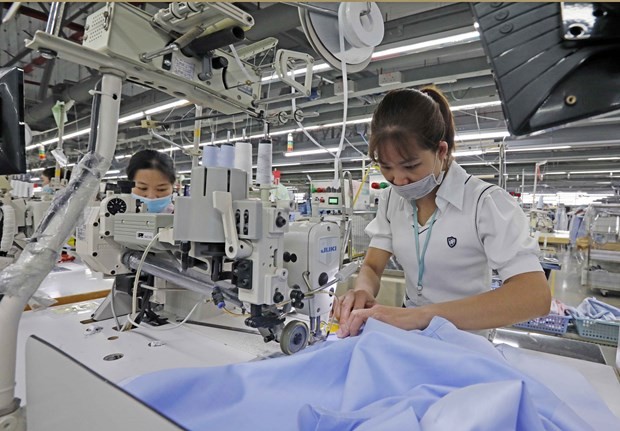
Green transition is an urgent need for sustainable export to EU: Experts
Latest
 |
| A garment factory in Vietnam. Garment is among the country's main exports to the EU. (Photo: VNA) |
Participants in the event, organized by the Cong Thuong (Industry & Trade) magazine, pointed out that in the third year of implementing the EU - Vietnam Free Trade Agreement (EVFTA), the country’s export advantages and results have been partly affected by the EU’s further application of high standards and increase of special requirements related to environment and sustainability for imports.
Ngo Chung Khanh, Deputy Director of the Multilateral Trade Policy Department at the Ministry of Industry and Trade, said sustainable development is a chapter of the EVFTA, and it covers environmental and labor aspects.
Unlike normal free trade agreements, sustainability forms a very important part of the EVFTA, so businesses exporting goods to the EU need to pay more attention to the issues mentioned in this deal, he went on.
Nguyen Hong Loan, an expert on the technical assistance project on impact assessment of the EU’s Carbon Border Adjustment Mechanism (CBAM), said the EU has long had very high environmental standards.
These regulations have been tightened recently, starting with the approval of the European Green Deal that targets slashing greenhouse gas emissions by 55 per cent by 2030 compared to 1990 and achieving net zero emissions by 2050.
Nguyen Thi Thu Trang, Director of the Centre for WTO and International Trade under the Vietnam Chamber of Commerce and Industry (VCCI), noted that the EU’s green or sustainability standards cover all the products considered strengths of Vietnam, including agricultural and fishery products, wood items, textile - garment, and leather - footwear. Therefore, the number and scope of affected Vietnamese businesses and exports are considerable.
This is also a challenge to domestic firms since those standards require gradual changes towards sustainability, which means businesses have to keep frequent monitoring to ensure their adherence. Besides, compliance with these standards also needs better awareness, greater efforts, and bigger expenses from businesses, especially small- and medium-sized ones, she added.
Vuong Duc Anh, Chief of the Office of the Board of Directors at the Vietnam National Textile and Garment Group (Vinatex), said that to Vinatex, sustainable development is a long-term strategy that could not be carried out overnight or immediately. Therefore, the group will have to closely follow the requirements of markets.
Vinatex is working to prepare strategic manpower for sustainable development by improving their awareness and equipping them with the necessary knowledge.
In particular, the pilot manufacturing of sustainable products will be costly but also necessary since sustainable development is a target in its medium- and long-term strategies, Anh added.





















